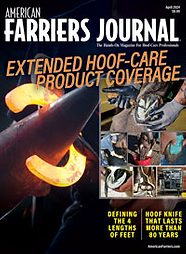As the morning sun rises, aches and pains from stiff muscles and joints try to persuade you that it’s not a good idea to climb under another horse today.
You’ve been pulled and leaned on enough, they say. Your elbow screams that it doesn’t want anything to do with a hammer and anvil today. Your patience is on life support just thinking about that inconsiderate and ill-informed client you’ll be dealing with this afternoon.
They’re all futile arguments.
Not only will you climb under another horse, there will be another 10 as well. And each one of them will receive your best effort.
You have plenty invested in the art and science of farriery — blood, sweat and yes, sometimes tears. Behind it all is a deep, abiding passion for your trade, your family and your horses.
No, in the eyes of the law you don’t own the horses, but you don’t have to. They’re yours nonetheless.
Arlington, Wash., farriers Dawn and Jon Dofelmier have a lot of horses. Trooper was one of them.
“To the woman whom we’ve been your farrier for the past 18 years:
“Your horse died in my arms this morning while you slept soundly in your bed 50 feet away.
“To some horses, we are more than their farriers. We are the only people they come to know and show affection toward.
“I could have said no many times, but she was on our way home each day. She was easy, and if I said no, she likely would have gone without eating.
“As we watched her grow older, we made sure she was warm and dry since she was without shelter. We brought her hot mashes in the cold — all while you had one excuse after another for why you couldn’t be bothered to leave your home and care for her.
“Over the years, she often waited twice a day for our truck and went galloping to her gate when we arrived.
“While you sat in your house watching TV on Saturday, we groomed the winter fuzz off. We brought grain or hay, whatever she needed. I would call and leave the receipt, and a check would be taped to the door.
“Yesterday, she wasn’t right. I called and called. Finally, you answered and say, ‘My back is out. Can you handle the vet, please?’
“Can I? No, not really. You see, I have a job. I work long hours. I have bills to pay. I have horses of my own. But what did I do? I called the vet, for Trooper’s sake.
“‘He can’t get there till tomorrow morning. Can I call another vet?’ I ask. ‘She’s really not right. I think she has pneumonia.’
“‘Well,’ you say, ‘I really want to use my own vet.’
“I got up at midnight and drove in the rain to your house to check on your horse. She was worse. I called your vet. He couldn’t come. I tried to wake you, but to no avail. After a couple of hours, I called my own vet and I stood with your horse and cried until he could get there.
“I knew she was dying, and so did she. She laid down and I cradled her while she passed, because to her I wasn’t just her farrier. I was one of only a few people in her life who had time for her. At least she died knowing that I cared.
“Today, I waited for your call. It came at 4 p.m. Yes, that’s right. It took you 12 hours after I had been in your field crying to notice that she had passed.
“That’s OK, though. To you, I was just your farrier.
“To your horse, I remembered to be more.”
Each July, we salute the passion and dedication that the Dofelmiers personify during National Farriers Week. We are asking the equine community join the July 10-16 celebration by submitting photos, videos and stories about their farriers. We will feature a number of them in the July/August issue of American Farriers Journal, while all will be shared in our annual Farriers Spotlight.








Post a comment
Report Abusive Comment